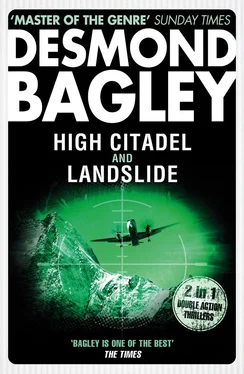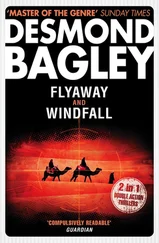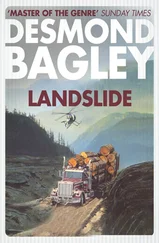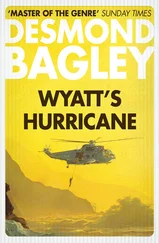‘There is a pass about two miles north-west of the mine,’ said Rohde. ‘It has no name because no one is so foolish as to use it. It is about five thousand eight hundred metres.’
Forester rapidly translated. ‘Wow! Nineteen thousand feet.’
‘What about lack of oxygen?’ asked O’Hara. ‘We’ve had enough trouble with that already. Could a man go over that pass without oxygen?’
‘I have done so,’ said Rohde. ‘Under more favourable conditions. It is a matter of acclimatization. Mountaineers know this; they stay for days at one level and then move up the mountain to another camp and stay a few days there also before moving to a higher level. It is to attune their bodies to the changing conditions.’ He looked up at the mountains. ‘If I went up to the camp tomorrow and spent a day there then went to the mine and stayed a day there – I think I could cross that pass.’
Forester said, ‘You couldn’t go alone.’
‘I’ll go with you,’ said O’Hara promptly.
‘Hold on there,’ said Forester. ‘Are you a mountaineer?’
‘No,’ said O’Hara.
‘Well, I am. I mean, I’ve scrambled about in the Rockies – that should count for something.’ He appealed to Rohde. ‘Shouldn’t it?’
Aguillar said, ‘You should not go alone, Miguel.’
‘Very well,’ said Rohde. ‘I will take one man – you.’ He nodded to Forester and smiled grimly. ‘But I promise you – you will be sorry.’
Forester grinned cheerfully and said, ‘Well, Tim, that leaves you as garrison commander. You’ll have your hands full.’
‘ Si ,’ said Rohde. ‘You must hold them off.’
A new sound was added to the noise of the river and Rohde immediately wriggled up to his observation post, then beckoned to O’Hara. ‘They are starting their engines,’ he said. ‘I think they are going away.’
But the vehicles did not move. ‘What are they doing?’ asked Rohde in perplexity.
‘They’re charging their batteries,’ said O’Hara. ‘They’re making sure that they’ll have plenty of light tonight.’
O’Hara and Aguillar went back to help the women make camp, leaving Rohde and Forester watching the bridge. There was no immediate danger of the enemy forcing the crossing and any unusual move could soon be reported. Forester’s attitude had changed as soon as the decision to cross the mountains had been made. He no longer drove hard for action, seemingly being content to leave it to O’Hara. It was as though he had tacitly decided that there could be only one commander and the man was O’Hara.
O’Hara’s lips quirked as he mentally reviewed his garrison: An old man and a young girl; two sedentary academic types; a drunk and someone’s maiden aunt; and himself – a broken-down pilot. On the other side of the river were at least twenty ruthless men – with God knows how many more to back them up. His muscles tensed at the thought that they were communists; sloppy South American communists, no doubt – but still communists.
Whatever happens, they’re not going to get me again, he thought.
Benedetta was very quiet and O’Hara knew why. To be shot at for the first time took the pith out of a person – one came to the abrupt realization that one was a soft bag of wind and liquids, vulnerable and defenceless against steel-jacketed bullets which could rend and tear. He remembered the first time he had been in action, and felt very sorry for Benedetta; at least he had been prepared, however inadequately, for the bullets – the bullets and the cannon shells.
He looked across at the scattered rocks on the bleak hillside. ‘I wonder if there’s a cave over there?’ he suggested. ‘That would come in handy right now.’ He glanced at Benedetta. ‘Let’s explore a little.’
She looked at her uncle who was helping Miss Ponsky check the cans of food. ‘All right,’ she said.
They crossed the road and struck off at right angles, making their way diagonally up the slope. The ground was covered with boulders and small pebbles and the going was difficult, their feet slipping as the stones shifted. O’Hara thought that one could break an ankle quite easily and a faint idea stirred at the back of his mind.
After a while they separated, O’Hara to the left and the girl to the right. For an hour they toiled among the rocks, searching for something that would give shelter against the night wind, however small. O’Hara found nothing, but he heard a faint shout from Benedetta and crossed the hillside to see what she had found.
It was not a cave, merely a fortuitous tumbling of the rocks. A large boulder had rolled from above and wedged itself between two others, forming a roof. It reminded O’Hara of a dolmen he had seen on Dartmoor, although the whole thing was very much bigger. He regarded it appreciatively. At least it would be shelter from snow and rain and it gave a little protection from the wind.
He went inside and found a hollow at the back. ‘This is good,’ he said. ‘This will hold a lot of water – maybe twenty gallons.’
He turned and looked at Benedetta. The exercise had brought some colour into her cheeks and she looked better. He produced his cigarettes. ‘Smoke?’
She shook her head. ‘I don’t.’
‘Good!’ he said with satisfaction. ‘I was hoping you didn’t.’ He looked into the packet – there were eleven left. ‘I’m a selfish type, you know; I want these for myself.’
He sat down on a rock and lit his cigarette, voluptuously inhaling the smoke. Benedetta sat beside him and said, ‘I’m glad you decided to help my uncle.’
O’Hara grinned. ‘Some of us weren’t too sure. It needed a little tough reasoning to bring them round. But it was finally unanimous.’
She said in a low voice, ‘Do you think there’s any chance of our coming out of this?’
O’Hara bit his lip and was silent for a time. Then he said, ‘There’s no point in hiding the truth – I don’t think we’ve got a cat in hell’s chance. If they bust across the bridge and we’re as defenceless as we are now, we won’t have a hope.’ He waved his hand at the terrain. ‘There’s just one chance – if we split up, every man for himself heading in a different direction, then they’ll have to split up, too. This is rough country and one of us might get away to tell what happened to the rest. But that’s pretty poor consolation.’
‘Then why did you decide to fight?’ she said in wonder.
O’Hara chuckled. ‘Armstrong put up some pretty cogent arguments,’ he said, and told her about it. Then he added, ‘But I’d have fought anyway. I don’t like those boys across the river; I don’t like what they do to people. It makes no difference if their skins are yellow, white or brown – they’re all of the same stripe.’
‘Señor Forester was telling me that you fought together in Korea,’ Benedetta said.
‘We might have – we probably did. He was in an American squadron which we flew with sometimes. But I never met him.’
‘It must have been terrible,’ she said. ‘All that fighting.’
‘It wasn’t too bad,’ said O’Hara. ‘The fighting part of it.’ He smiled. ‘You do get used to being shot at, you know. I think that people can get used to anything if it goes on long enough – most things, anyway. That’s the only way wars can be fought – because people can adapt and treat the craziest things as normal. Otherwise they couldn’t go through with it.’
She nodded. ‘I know. Look at us here. Those men shoot at us and Miguel shoots back – he regards it as the normal thing to do.’
‘It is the normal thing to do,’ said O’Hara harshly. ‘The human being is a fighting animal; it’s that quality which has put him where he is – the king of this planet.’ His lips twisted. ‘It’s also the thing that’s maybe holding him back from bigger things.’ He laughed abruptly. ‘Christ, this is no time for the philosophy of war – I’d better leave that to Armstrong.’
Читать дальше












